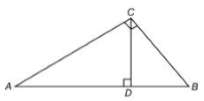Refer to the figure in which  ?
?  and
and  ?
?  .
. 
If AB = 16 ft and BC = 6 ft, find BD.


You might also like to view...
Use integration by parts to establish a reduction formula for the integral.
A.  = ax(ln ax) n - an
= ax(ln ax) n - an 
B.  =
=  +
+ 

C.  =
=  -
- 

D.  = x(ln ax) n - n
= x(ln ax) n - n 
Use the fact that the 

Fill in the blank(s) with the appropriate word(s).
Determine whether the graph is that of a function. If it is, use the graph to find its domain and range, the intercepts, if any, and any symmetry with respect to the x-axis, the y-axis, or the origin.
A. function domain: all real numbers range: {y|y ? 9} intercepts: (0, -2), (8, 0), (0, 4) symmetry: none B. function domain: all real numbers range: {y|y ? 9} intercepts: (-2, 0), (0, 8), (4, 0) symmetry: none C. function domain: {x|x ? 9} range: all real numbers intercepts: (-2, 0), (0, 8), (4, 0) symmetry: y-axis D. not a function
Provide an appropriate response.State whether the following situation represents direct variation, inverse variation, or neither, and explain why: A runner's speed in a race and the time that it takes to run the race.
What will be an ideal response?